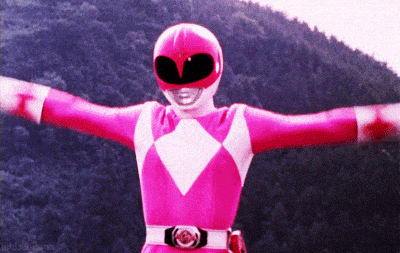|
|
Post by Mighty Jack on Apr 20, 2012 23:14:36 GMT -5
Last one for the week. I'm still debating 1956 – and have a group of DVDs I’m waiting to see for that year. Hope to get back to this by next Wed. 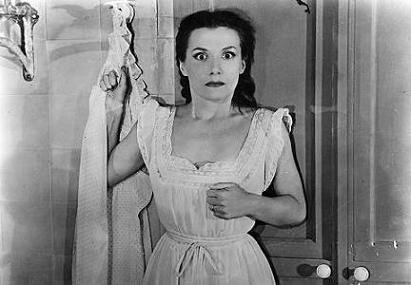 1955Diabolique (Henri-Georges Clouzot) 1955Diabolique (Henri-Georges Clouzot)Nominees: Ordet, The Night of the Hunter, Samurai 2: Duel at Ichijoji Temple, Smiles of a Summer Night Oscars pick: MartyNominees: Love is a Many-Splendored Thing, Mister Roberts, Picnic, The Rose Tattoo I like Oscar's pick Marty, and I think Ernest Borgine did a hell of a job in the title role. There's a scene near the beginning, with Marty on the phone with a woman who wants nothing to do with him - and the expressions on his face, his body language... it was simple brilliance the way he brought this heartbreaking sequence to life. But I think the second half of the film loses steam, and the situations that stood in the way of Marty's happiness came off contrived. Better than Marty... Charles Laughton's lone directorial effort, Night of the Hunter is a beautifully crafted nightmarish fairy tale. It's about two children on the run from a man who killed their mother (in want of a large sum of cash they have hidden). Laughton was ever a broad, theatrical performer, and he brings that element to the film. You either buy into that, or you don't. For the most part I do - thought some of the cartoon shenanigans didn't sit well. As in the silly moment when Robert Mitchum's evil Preacher is shot in the ass and he runs off hooting and hollering like Daffy Duck. I also found the ending rather cornball. (I know I'm nitpicking on movies I love, but bear with me, as it is sometimes the only tool I have to separate one from the other) From Denmark - Carl Theodor Dreyer's Ordet is slow. Slow really isn't a flaw in this case, but tolerance for such things, even good things like Ordet can come into play (Great craftsmanship matters little if you're too bored to care or keep your eyes awake). The shot sequences, the editing, acting and dialog are all expertly integrated to create a certain rhythm. That rhythm is measured and requires some concentration -- but rich rewards are had if you can stick with it. Ordet is not plot driven; it's about a family of simple farmers and their relationship with God. One member is driven to madness (after reading too much Kierkegaard, lol) and now believes he is Jesus. The film is rendered in a style Dreyer called, "Psychological reality" (it comes off both naturalized and dream-like). I think the movies basic theme is how religion can divide and hurt, but also how faith can restore (and how children and the insane are more open to God than anyone). It's a superb picture, but yeah, it is slow - even the actor's movements are slow. From France – Henri-Georges Clouzot's devilishly manipulative Diabolique concerns two women who plan and carry out a murder… but things begin to unravel. The story is an ever-twisting wide-awake nightmare. The paranoia and tension builds and builds and leads to a crescendo that’s cold hearted cruel. The film is pitch black and just about pitch perfect. Ordet is the objective choice in terms of cinematic technique; the film is pretty near flawless. But I can't deny the pull of Diabolique – I find myself drawn inexorably to the picture despite its dark heart. Note: I’ve never seen Satyajit Ray’s Apu Trilogy, the first of which was released in 1955 and is consider by several critics as the best movie of the year. It’s been impossible to track down –the only DVD I’ve seen for sale is expensive and from reviews, the picture is in horrible shape. It would be nice if Criterion could acquire the rights, restore and release this respected series. |
|
Torgo
Moderator Emeritus    -segment with Crow?
-segment with Crow?
Posts: 15,420
|
Post by Torgo on Apr 20, 2012 23:46:50 GMT -5
1955? I had no clue Sharron Stone was that old.
I guess it makes sense.
|
|
|
|
Post by Mighty Jack on Apr 21, 2012 0:18:41 GMT -5
I've tried to erase that version from my memory bank.
|
|
Torgo
Moderator Emeritus    -segment with Crow?
-segment with Crow?
Posts: 15,420
|
Post by Torgo on Apr 21, 2012 1:42:56 GMT -5
I'm glad I could bring back happy memories!
|
|
|
|
Post by Mighty Jack on Apr 25, 2012 23:45:59 GMT -5
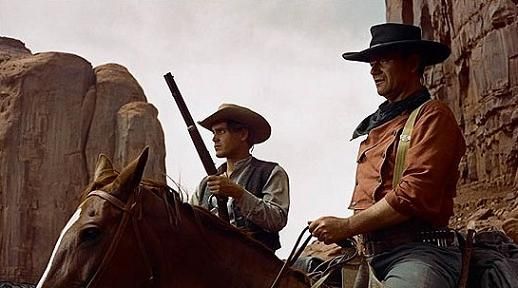 1956The Searchers (Director: John Ford) 1956The Searchers (Director: John Ford)Nominees: Lust for Life, The Wrong Man, Tea and Sympathy, Samurai 3: Duel At Ganryu Island, The 10 Commandments, Invasion of the Body Snatchers, The Killing Oscars pick: Around the World in 80 DaysNominees: Friendly Persuasion, Giant, the King and I, The 10 Commandments Around the World in 80 Days is the worst film to ever win Best Picture. Some folks call it somewhat entertaining -- about the only entertainment I derived from it was in the cameo by Buster Keaton. The cinematography was pretty but the film is a ponderous, overlong, glorified travelogue. I also didn't care for the overcooked Giant. And James Dean fans might want to avert their eyes, because I found his performance laughable (especially in the old man stages) If the Academy hadn't already stubbed its toe giving DeMille's Greatest Show on Earth the award a few years back, they might have gone with the superior 10 Commandments. Tomatoes called it "Bombastic and occasionally silly but extravagantly entertaining." I liked it enough to give it a nomination. The film that most embrace as the years best wasn’t even nominated, John Ford's The Searchers. It's a breathtakingly beautiful film and Ford's manner of filming vistas with a wide-open line of sight, has been imitated by the likes of Kurosawa and Eastwood. The story of two men’s tireless pursuit of a tribe of Indians that killed and kidnapped members of their family - makes for one of the greatest, most powerful westerns ever filmed. It’s about a changing west, and a man, Ethan Edwards, who is set in that past, and who is fueled by hatred for those he hunts. It features one of John Wayne’s finest performances, one of the best of any actor in any age. He shows a great range - in quiet moments, when you see the subtle anguish on his face when as he realizes that he’s too far away to save his family from being massacred by the Indians. In the volatile, as when he expresses his anger and sickness over what he saw in the hills. And the twisted small smile he wears when he shoots the eyes of a dead Indian. The racism in the man is white hot and ugly. So why did I even consider another film? Because the Searchers has its flaws. The theatrical romance and moments of ham-fisted comedy (especially during the letter reading scenes) are awkwardly slotted into the story. But when I watched my other contender’s looking for something better. None could surpass Ford's masterpiece. Among my nominees: Kubrick's tense noir caper, The Killing, Which is highlighted by quick cutting dialog and vivid performances, especially Sterling Hayden, Elisha Cook jr. and Marie Windsor as one devilishly delightful femme fatale. Hiroshi Inagaki closes his sweeping Samurai Trilogy with Duel At Ganryu Island - a great finish to a great series, which is often referred to as the Gone With the Wind of Japanese cinema. The scary Invasion of the Body Snatchers, the drama Tea and Sympathy and Hitchcock's successful stab at art house styling, The Wrong Man with Henry Fonda, round out my nominees. The Searchers strongest competition came from Vincente Minneli and his look at the life of Vincent van Gogh, Lust For Life speaks to me on a deeply personal level. I know how the creative process can consume you; it’s something akin to madness. The sci-fi classic, the Forbidden Planet, (which was Shakespeare in space) and Bigger than Life, Nicholas Ray's honest, if melodramatic examination of drug addiction, and the western produced by John Wayne’s company, Seven Men From Now, were a few others I considered. |
|
|
|
Post by Mighty Jack on Apr 26, 2012 22:58:33 GMT -5
 1957The Seventh Seal (Director: Ingmar Bergman) 1957The Seventh Seal (Director: Ingmar Bergman)Nominees: Wild Strawberries, Kana³, Paths of Glory, Nights of Caberia, Throne of Blood, 12 Angry Men, Witness For the Prosecution, A Face in the Crowd Oscars pick: The Bridge on the River KwaiNominees: Peyton Place, Sayonara, 12 Angry Men, Witness For the Prosecution While there were great productions released in 1957 such as Kubrick's powerful and bleak anti-war story, Paths of Glory and Billy Wilder's courtroom mystery, Witness For the Prosecution. 12 Angry Men with Henry Fonda giving one of his best performances. Kazan's A Face in the Crowd with Andy Griffiths electrifying staring role. Kurosawa's Throne of Blood, Wadja's Kana³ and Fellini's Nights of Caberia were also considered. Among them all though, this year belonged to the Swede, Ingmar Bergman Bergman had put together an impressive body of work from the late 40s to mid 50s. But in 1957 he elevated his game to the level of undeniable genius. The Seventh Seal's reputation is built upon its art and solemnity: The rich shadowy photography that calls to mind the work of the Dane, Carl Theodor Dreyer. its themes of war and plague and ignorance. Of the dance with death and the chess match. Of the grim Knight (played by Max Von Sydow) who wrestles with existential angst and hungers to know if God and the Devil exists. An answer to which neither a witch nor Death itself can provide. Woody Allen called the piece a "Sinister fairy tale" and considers Bergman, cinemas most intellectual voice. But what he and others fail to consider is that Seventh is quite humorous. The banter is reminiscent of Shakespeare in the clever way it slips off the tongue and strikes like pointed daggers. People smile in this movie; they joke around and play, even as they contend with matters of life... and Death - a being that is both sinister and cunning, but is not without a sense of humor of his own (as when he saws a tree in order to take down the doomed man who is hiding there). This then is one of filmdoms most perceptive fusions of comedy and tragedy. But Ingmar wasn't done; later in that same year he released Wild Strawberries. A poignant and wise drama of an aging professor who looks back at his life as he travels to receive an award. Bergman employs surrealistic dreams, rife with dark symbolism, shock cuts and sound that reflect the director's passion for German Expressionism. Strawberries was the first Bergman movie I'd ever seen, and it knocked me out. It remains to this day one of my favorites. I could have selected either picture, or gone with a tie. But decided to go with the Seventh Seal, as it's the more iconic. I liked the Academy’s choice, David Lean's highly respected, The Bridge on the River Kwai. Though I feel the film loses focus as it spins towards its end (and after the first 2 hours, I got the point. There was no need to belabor it) |
|
|
|
Post by Mighty Jack on Apr 27, 2012 23:13:14 GMT -5
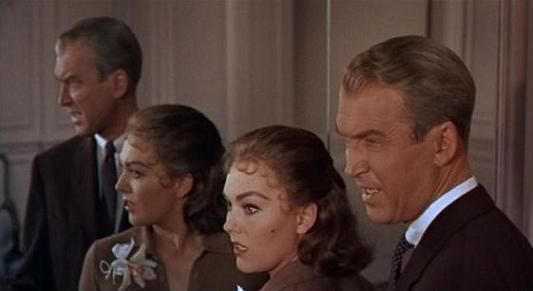 1958Vertigo (Director: Alfred Hitchcock) 1958Vertigo (Director: Alfred Hitchcock)Nominees: Touch of Evil, The Hidden Fortress, Cat on a Hot Tin Roof, The Defiant Ones Oscars pick: Gigi Nominees: Auntie Mame, Cat on a Hot Tin Roof, The Defiant Ones, Separate Tables The musical Gigi was a cute, but it wasn't the best picture. There really wasn’t a lot that was best picture material. I liked Kurosawa's Hidden Fortress, the adaptation of Tennessee William's Cat on a Hot Tin Roof, and the Defiant Ones. But the best came down to two masters of form and composition - Orson Welles, with the expertly directed Touch of Evil, and Alfred Hitchcock with his magnum opus, Vertigo.And there was only one real choice in my mind. As great as Welles' picture is, Hitchcock does him one better. Vertigo has the trappings of a mystery, but the mystery is just the MacGuffin - a tool to get the stars aligned, get these characters together and dig into the heart of the matter. That heart is obsession. The entire film is about that psychological spiral: From the haunting music to the Saul Bass credit sequence... it's all about circles, turning around into themselves. James Stewart does his best, most shaded work as a man sinking further and further into a kind of madness. He as much objectifies this woman, as he does genuinely love her. He will reshape another (he assumes) into her image and lose himself completely. The movie is the quintessential example of Hitchcock's expressionistic techniques. Every detail -from sound to color to editing- is vital to the theme, character and narrative of the feature. It’s loaded with eerie subtle moments that become even more apparent in repeat viewings (note the look in Madeleine's face when Scottie speaks of the past. A past she is familiar with but can't acknowledge). All of this makes the movie timeless. I've written about Vertigo on so many occasions I’m starting to sound like a broken record. So I'll just stop and say what the Academy should have said - "And the Oscar (and Felix) for best picture goes to... Vertigo" Art by Rob Kelly Art by Rob Kelly |
|
|
|
Post by Mighty Jack on Apr 30, 2012 16:43:50 GMT -5
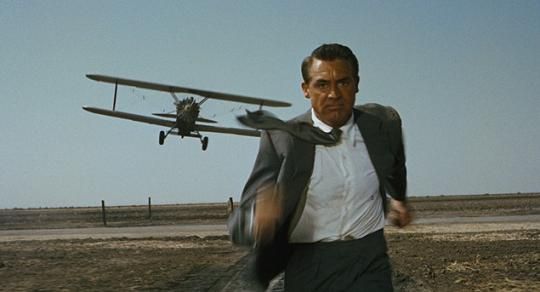 1959North by Northwest (Director: Alfred Hitchcock) 1959North by Northwest (Director: Alfred Hitchcock)Nominees: Anatomy of a Murder, Nazarin, Some Like it Hot, Rio Bravo, The 400 Blows Oscars pick: Ben-HurNominees: Anatomy of a Murder, Diary of Anne Frank, The Nuns Story, Room at the Top While I admired Truffaut's landmark 400 Blows and was entertained by the Howard Hawk’s John Wayne western Rio Bravo, there were 3 I primarily juggled about in my noggin. Some Like It Hot is Billy Wilder's hillarious comedy about a couple of musicians who dress up as women and join an all-girls band, in order to hide out from the mob. Hot is a delight, marked by delightful performances from Marilyn Monroe, Tony Curtis (doing a funny/bad Cary Grant impression) and in a role that should have nabbed him the Oscar for best actor, Jack Lemmon. The only knock with this flick is that I find the ending and its lack of resolution unsatisfying. So I whittled it down to two... North By Northwest is Alfred Hitchcock's quintessential example of his ‘man on the run’ type film. In a case of mistaken identity, Cary Grant gets drawn into a game of cat and mouse. In a movie that is suspenseful, romantic and funny, Anatomy of a Murder is Otto Preminger's controversial courtroom drama with Jimmy Stewart playing a lawyer hired to defend a soldier accused of killing a man accused of raping his wife. Despite my familiarity with the genre and its 3-hour length, it never got tiresome. I'd love to select Anatomy, it's a great movie and it would be nice to show Preminger some love. But North by Northwest is too wonderful to bypass. It’s an audacious thrill ride that ranks as my second favorite flick from the master. Watching my top 3 side by side, it's supremacy could not be denied. Up next: The greatest directors in cinema history release some brilliant movies... with all that stiff competition, can Hitchcock (with a little help from Mother Bates) pull off a threepeat?Edit: Just watched and added Luis Buñuel's powerful "Nazarin" to my list of nomanees. |
|
|
|
Post by Mighty Jack on May 1, 2012 15:47:28 GMT -5
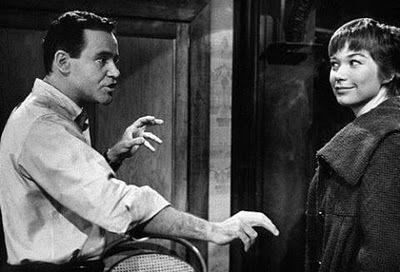 1960The Apartment (Director: Billy Wilder) 1960The Apartment (Director: Billy Wilder)Nominees: Psycho, La Dolce Vita, The Virgin Spring, Breathless, L'Avventura, The Young One, Wild River, Spartacus, Eyes Without a Face Oscars pick: The ApartmentNominees: The Alamo, Elmer Gantry, Sons and Lovers, the Sundowners The 60s and early 70s are considered a golden age for Hollywood. Filmmakers were breaking free from the bonds of the censorship code, which allowed for freedom of expression and experimentation. This, and the fact that the summer blockbuster wouldn’t become part of the vernacular until 1975, with the release of Jaws (a movie that changed everything. Not always for the better). It was an era of challenging cinema, where even comedy was often thought provoking. Anyhoo --- I've taken away Oscar's, and had him just miss the cut in other years, but this time out I’ll not screw over one of my favorite directors, Billy Wilder. While there are outstanding movies to chose from in 1960, and my list of nominees reads like a "who’s who" of cinematic brilliance: Hitchcock, Fellini, Godard, Kazan, Kubrick, Bergman, Franju, Bunuel and Antonioni (Jesus, this was a golden age). I simply love the Apartment with a passion and believe the Academy of Motion Picture Arts and Sciences got it right when they selected Billy Wilder's classic as its best of the year. Among my nominees: Breathless (aka, À bout de souffle (By a Tether)) helped give birth to the French New Wave and is Jean Luc Godard's jazzy free-form ode to the American films genres that inspired him as writer and filmmaker. What it lacks in discipline (and there are stretches where the improv gets dull) it makes up for in attitude and the hip frothiness of its stars, Jean-Paul Belmondo and Jean Seberg. It also boasts of another one of my favorite film quotes - "My greatest ambition in life is to become immortal... and then die"  Le Dolce Vita Le Dolce Vita is one of Fellini's twin masterpieces (along with 8 ½, which will be his next feature). The flip side of Le Dolce* was Michelangelo Antonioni's L’Avventura, a mystery that really isn't a mystery, but more an examination of the idle rich who have everything and nothing (see Roger Ebert's astute analysis for more on this challenging film) Bergman's tragic, brutal tale of revenge and redemption, The Virgin Spring, Hitchcock's spars, scary, beautifully photographed and scripted Psycho (which is only tripped up by that last scene in the Psychiatrists office), Bunuel's tale of racism and pedophelia The Young One (1 of only 2 English language films he made), Kazan's Wild River, Georges Franju's poetic and eerie Eyes Without a Face and Kubrick's Spartacus are all superb motion pictures – but I just can’t deny the great affection I have for the Apartment. It's a movie that draws me in, in so many ways: Intellectually, emotionally - - it's cynically funny, but it also has warmth to it. Jack Lemon and Shirley MacLaine share an on screen chemistry that is second to none, and Fred MacMurray does a damn good 'arse hole’. Plus the script is note perfect. Time magazine wrote that it's... "a comedy of men's-room humours and water-cooler politics that now and then among the belly laughs says something serious and sad about the struggle for success, about what it often does to a man, and about the horribly small world of big business"Mr. Wilder, this Felix is ‘finally’ for you. * = La Dolce Vita/L’Avventura were the films that defined the similarities and differences in each director, and became the litmus test on preference for one or the other among the Italian masters. The duo might also be linked as geniuses on opposite ends of the creative spectrum -in part- because critic Pauline Kael hated Fellini’s surreal and personal/emotional indulgences, but got squishy like a schoolgirl over Antonioni’s cool intellectualism. And thus, debates were born |
|
|
|
Post by Mighty Jack on May 2, 2012 23:39:33 GMT -5
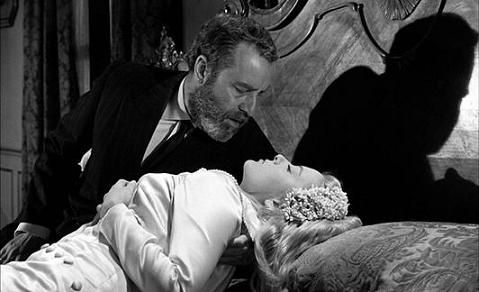 1961Viridiana (Director: Luis Buñuel) 1961Viridiana (Director: Luis Buñuel)Nominees: Yojimbo, West Side Story, Breakfast at Tiffany’s, One Eyed Jacks, Judgment at Nuremberg, Peeping Tom Oscars pick: West Side StoryNominees: Fanny, Guns of Navarone, The Hustler, Judgment at Nuremberg West Side Story enthralled me in my youth -- and while I can see its imperfections in my adulthood, I still enjoy the Oscar winner (a modern, musical telling of Romeo and Juliet) enough to give it a nomination. In addition to that I’m madly in love the flawed but captivating Breakfast at Tiffany's and Kurosawa's brilliant Yojimbo. But one movie towers above them all: Viridiana - Luis Buñuel's scathing look at religion and humiliation... which he saw as going hand in hand. He also looks at Saintly trials and sacrifice as sought after –not for want of holiness- but for love of suffering. Bathed in sociopolitical symbolism, Viridiana is complex, cruel, darkly funny and endlessly thought provoking. Since I’ve recently written about the film elsewhere, I’ll share critic Hal Erickson’s thoughts... "After 25 years' exile, Luis Buñuel was invited to his native Spain to direct Viridiana -- only to have the Spanish government suppress the film on the grounds of blasphemy and obscenity. Regarded by many as Buñuel's crowning achievement, the film centers on an idealistic young nun named Viridiana (Silvia Pinal). Just before taking her final vows, Viridiana is forced by her mother superior to visit her wealthy uncle Don Jaime (Fernando Rey), who has "selflessly" provided for the girl over the years. She has always considered Don Jaime an unspeakable beast, so she is surprised when he graciously welcomes her into his home. Just as graciously, he sets about to corrupt Viridiana beyond redemption -- all because the girl resembles his late wife. It is always hard to select the most outrageous scene in any Buñuel film; our candidate in Viridiana is the devastating Last Supper tableau consisting of beggars, thieves, and degenerates. As joltingly brilliant today as on its first release, Viridiana won the Golden Palm at the Cannes Film Festival." |
|
|
|
Post by Mighty Jack on May 4, 2012 23:11:09 GMT -5
 1962To Kill a Mockingbird (Director: Robert Mulligan) 1962To Kill a Mockingbird (Director: Robert Mulligan)Nominees: Sanjuro, Charade, Mafioso, Ride the High Country, Lawrence of Arabia, The Exterminating Angel, Mutiny on the Bounty, The Manchurian Candidate, The Miracle Worker, David and Lisa Oscars pick: Lawrence of ArabiaNominees: The Longest Day, The Music Man, Mutiny on the Bounty, To Kill a Mockingbird David Lean's Lawrence of Arabia can sometimes get as dry as the desert its set in. The film lasts nearly 4 hours, with wide-angle long shot sequences that stretch out beyond reason. But it does tell its tale –set during WWI- on a grand scale. And it frequently sparks to life with humor, adventure and sharp character interaction, AND Peter O’Toole is impressively charismatic. Never the less, I don’t find it the unassailable best picture of the year as many do. It can get repetitive (twice Lawrence has a breakdown, is resolute in wanting out, but is suddenly made to change his mind) and sometimes O’Toole just stares and flashes those pretty blue eyes in lieu of real acting. A film I preferred was the transcendent southern tale To Kill A Mockingbird. Drawing from Harper Lee's semi-autobiographical novel (the character of Dill was based on her longtime friend, Truman Capote), it tells its story through the eye of a child - as siblings Jem and Scout discover truths about prejudice, misconception, as well as learning that their unglamorous, unconventional father, was truly an admirable man. To me it's a beautiful film, with a Southern gothic ambience that mixes romanticism with harsh reality - something that is reflected in the cinematography, direction, Elmer Bernstein's score, and the screenplay penned by Horton Foote. Acting-wise Gregory Peck gives the performance of his career and young Mary Badham is memorable as tomboy Scout. She's a natural, believable - which was needed as this tale unfolds through her eyes. Mockingbird captures the essence of the novel, but improves upon it by cutting out the excess and the –at times- condescending tone. Like 1960, 1962 offered up a surfeit of impressive productions. Among my remaining 10 nominated films was the edgy cold war thriller The Manchurian Candidate. A political satire that featured superb direction by John Frankenheimer and editing by Ferris Webster, as well as a colorful performance from Angela Lansbury playing one evil mother. The only wee knock is with the inclusion of the Dragnet-sounding narrator. I also want to call attention to the comedic crime drama Mafioso, from eclectic Alberto Lattuada (a lesser known, but talented name in Italian film). And Sam Peckinpah's wonderful début Ride the High Country, a western which brought some old timers back to the big screen, Randolph Scott and Joel McCrea. |
|
|
|
Post by Mighty Jack on May 7, 2012 14:40:00 GMT -5
 19638 ½ (Director: Federico Fellini) 19638 ½ (Director: Federico Fellini)Nominees: The Birds, The Trial, Contempt, This Sporting Life, Lilies of the Field, America, America, High and Low Oscars pick: Tom JonesNominees: America, America, Cleopatra, How the West Was Won, Lilies of the Field It seems every year my beloved Fellini is surpassed by slightly superior efforts, but in 1963 there was not a shadow of a doubt. The year belonged to him. As much as I like my nominees, none of them quite approach the epic genius of Federico’s masterpiece. 8 ½ is an exhilarating viewing experience and it fits my film/artistic sensibilities to a “T”. It’s surreal and challenging, but not so completely enigmatic that I found it impossible to understand. Like most Fellini films it is deeply personal: In trying to make a movie, Federico hit a block - and so he made the movie about struggling to make a movie. The picture is a banquet for the eyes and imagination; some images were created simply for the pleasure of their aesthetic value alone -- which has confounded critics over the years (ala, the casting of old women as Priests. There was no secret symbolism attached to it as some supposed, Fellini just like the way they looked). While other images were done for clear reasons - to illustrate the mindset and character of the people in a scene - as in a driving sequence, where the male passenger is hidden in shadow, and the female driver next to him is immersed in light. In truth though, I'll let others beat this thing into submission with their reductionisms. I prefer to bathe in the glorious madness of it all. The movie has one foot set in inspired meaning, it addresses the nature of the creative process and the struggle to find meaning when your at a crossroads, and that deserves thoughtful consideration, true. But the other foot is there for unfettered artistic minds. It’s an exaltation of imagination and creativity, and one should just let go and drink that all in. Here’s Roger Ebert’s defense of the film at rogerebert.comItalian film historian Peter Bondanella called 8 ½, "art film colossal" – and considered it equitable to poetry, with cadence and meter.
On the end scene he wrote that, "Fellini wants his audience to experience an image designed to produce an emotion, not to analyze an idea designed to make an intellectual argument."Though no other movie could mount a serious challenge for 8 ½'s crown, there were other jewels - including the Birds, a movie Fellini called an apocalyptic poem. The British This Sporting Life, with Richard Harris playing a violent Rugby player. There was Elia Kazan's biographical America, America, and Orson Welles' adaptation of Kafka's The Trail – which was movie that split critics into "love or hate" camps. I obviously love it -- even without a budget it emerges as a brilliantly imaginative piece. Oh, and before I forget, I can't stand Oscar winner Tom Jones. I thought it was an idiotic film. |
|
|
|
Post by Mighty Jack on May 8, 2012 23:20:13 GMT -5
 1964 Dr. Strangelove or: How I Learned to Stop Worrying and Love the Bomb (Director: Stanley Kubrick) 1964 Dr. Strangelove or: How I Learned to Stop Worrying and Love the Bomb (Director: Stanley Kubrick)Nominees: A Hard Days Night, Gamlet (Hamlet), Goldfinger, Marnie, A Fistful of Dollars, Nothing But a Man, Umbrellas of Cherbourg Oscars pick: My Fair LadyNominees: Becket, Dr. Strangelove, Mary Poppins, Zorba the Greek Kubrick's Dr. Strangelove or: How I learned to Stop Worrying and Love the Bomb is a fantastic picture, a witty anti-war satire that shows what happens when the inmates and warmongers and the ineffectual run the asylum. Of the Academy's nominated features, it should have won the Oscar without a second thought. My Fair Lady was the top dog - a decent film, but it wasn't the overall best, or even the best musical... or even the second best musical for that matter. The bittersweet French romance The Umbrellas of Cherbourg and the Beatles A Hard Days Night showed more imagination, stronger camerawork and featured superior music to My Fair Lady.While there were some good flicks in 64, ultimately it was a 2 horse race: Kubrick vs. the Beatles. Dr. Strangelove is seen as the more important picture, message wise. But is it the best? While I think it's brilliant and funny ("Gentleman, you can’t fight in here, this is the war room!"), I wasn’t real found of the rambling end scene, and while Peter Sellers should have won the best actor award for 2 of his 3 performances, his turn as the title character was a big reason the finish floundered. As Strangelove, Sellers was a guy hamming it up and begging for laughs -- it didn't fit. The other characters in the movie were broad and absurd, but they came off real, or real-ish, rather than a political cartoon caricature. This is a minor quibble, very minor, as the rest of the film works like a dream. A razor sharp scripted, directed and acted dream. Apart from Sellers, my favorite moments came from George C. Scott. Playing ignorant hawk General Buck Turgidson, who is hilariously obsessed with the War Room’s ‘big board’. A Hard Days Night offers few messages (there’s a bit about phony commercialization with George Harrison) but is primarily a world of entertaining fun. Richard Lester's direction is breezy and clever – arc lights were allowed to shine in the camera, mistakes are kept in (Harrison tilting over his amp) and he borrows style-tips from the likes of Orson Welles (The scene where children peer at Anthony Perkins through wooden slats in The Trail, is echoed in a scene with teenage girls gawking at the Beatles who are in a cage on the train). The film makes me happy; the music is perfection, its funny and charming and a rock movie trendsetter. It also bears up under repeated viewing. It might not issue a timeless political statement but that doesn't mean that it isn't equally as great as Dr. Strangelove (and it does however offer timeless music). This was real, real difficult. And I even test posted each as the winner just to see how they looked and felt in that position. The problem is that my love for the Beatles colors any rational thought, But while A Hard Days Night is every bit as deserving of high praise, if I’m honest, Dr. Strangelove has a bit of an edge over it. (and I say that through gritted teeth. lol) |
|
|
|
Post by Mighty Jack on May 9, 2012 23:01:36 GMT -5
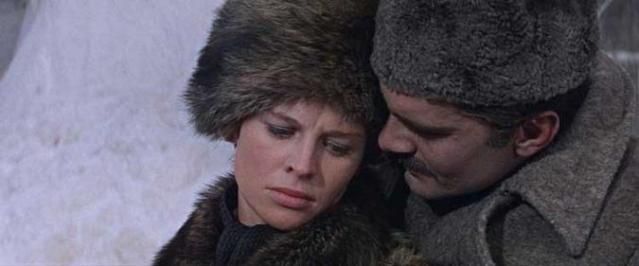 1965Doctor Zhivago (Director: David Lean) 1965Doctor Zhivago (Director: David Lean)Nominees: The Hill, Chimes at Midnight, Red Beard, Simon of the Desert, Juliet of the Spirits, Ship of Fools Oscars pick: The Sound of MusicNominees: Darling, Doctor Zhivago, Ship of Fools, A Thousand Clowns It's funny, whenever I read reviews on David Lean's Dr. Zhivago, they're always prefaced with the caveat that it's not as good as Lawrence of Arabia. I beg to differ. While I find Lawrence dry, Zhivago bristles with life. Both movies are grand sweeping stories nestled within a historical backdrop (here it's Russia during communist revolution). Both feature gorgeous cinematography and Lean's attention to detail - the remarkable transitions and way he stages scenes (ala, the juxtaposition of the slaying of the protestors, the blood on white snow, to Lara's implied loss of virginity and the later suicide attempt). The difference is that I'm more drawn to the romantic angles, and the human cost during troubling political times - the frustrating loss of freedom, the loss of self and loss of love; I "feel" something when I watch Zhivago and become completely entranced with the story and the characters. Its critics say the final half hour is filled with inexplicable personality shifts; I thought they fit the characters. Critics say the love story failed, but it touched me. Critics say the politics lack power, but I was affected. Critics even complain about Omar Sharif's end scene, I think their complaints petty because it worked for me. Critics say Lawrence is the far superior film and perhaps they are objectively right, but I'll always choose Zhivago. There are moments and imagery in this motion picture that I can't get out of my head to this day. While I liked 2 of their nominees, I wasn't so enamored with the film the Academy selected as the years best - the sappy, manipulative Sound of Music. Still, it's an institution, beloved by many - so I can't really call it an Oscar blunder. The Academy left out a couple of great films, among them. The criminally ignored wartime prison story, The Hill, with Sean Connery. Kurosawa's under-rated Red Beard, Roman Polanski's unnerving Repulsion (which I liked, but didn't love enough to nominate. Though many select it as the best film of the year). Buñuel's Simon of the Desert, Fellini's Juliet of the Spirits and Orson Welles’ Chimes at Midnight, which was made with no budget but still is considered one of the directors finest. Welles is the perfect Falstaff and as a director he is still the master of the tracking shot, deep focus shots and can compose a scene like no other, ala the great battle which had to be carefully framed and staged, using quick edits to make his mere 100 armed extras, seem an even larger force. Note: I always get a chuckle when I hear it said of B-movie makers like Coleman Francis etc, that if they only had a budget, they could have made good movies Yet Welles cobbled together a classic, with no money for set design or props or adequate equipment (the synching on this film suffers greatly). Making good movies isn't about money; it’s about talent – though in fairness Welles has some talented friends, who, as a favor to the director, would work for peanuts. Orson numbered John Gielgud among his friends while Coleman had Anthony Cardoza. |
|
|
|
Post by Mighty Jack on May 11, 2012 0:10:41 GMT -5
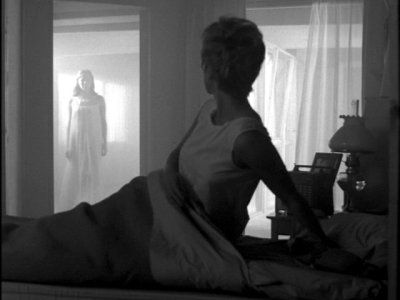 1966Persona (Director: Ingmar Bergman) 1966Persona (Director: Ingmar Bergman) Nominees: Masculin Féminin, The Good, the Bad and the Ugly, Blow-Up, Closely Watched Trains Oscars pick: A Man For All SeasonsNominees: Alfie, The Russians Are Coming, the Russians Are Coming, The Sand Pebbles, Who’s Afraid of Virginia Woolf I usually prepare my write-ups a week in advance, but I put this one off because I wasn't sure I could piece together a reasoned appraisal of the two movies at the top of my list. Bergman's Persona is a puzzle, like nothing I'd ever seen before. It's a mystifying mix of hallucination and dream and reality, used to address the nature of identity. Some critics might call it pretentious, but I don't see that as a detriment, because the director is so damn brilliant that he’s able to pull it off. Plus, I don't believe that this is showiness simply for the sake of showing off. Liv Ullman stars as an actress who suddenly stops talking in the middle of a performance. Her doctor suggests that she take rest at a seaside beach house, and assigns a nurse (Bibi Andersson) to look after her. And that sets the table for a relationship that shifts from caring to abusive -- and what is real is difficult to discern. The film is a challenge, one that demands multiple viewings. It engages the brain... as well as the eye, as it's wondrously surreal. That Persona is such an enigma is one of the reasons I enjoy it. The movie blows my mind. Jean-luc Godard’s artsy, if dated Masculin Féminin, was the directors first exploration of 60s generation youth (ala, the children of Marx and Coca-Cola as he described them). It too is difficult to summarize. It’s your basic free form style from the director, drawing from American film and popular culture. It centers on a relationship but it’s not really about romance. It’s hard to say what it’s about but critic Michael Wilmington described it as, "One of the quintessential '60s foreign art films, a bizarre melange of pop music, revolution, sex, movie allusions and poetry." I liked the Academy's choice A Man For All Seasons, quite a bit - others I'd recommend are my nominees, The Good, the Bad and the Ugly from Sergio Leone. Blow-up from Antonioni and Closely Watched Trains: A hilarious Czech film about a lazy guy who only wants one thing, to lose his virginity. All of these would be worthy of the award, but It was Bergman’s Persona that towered above them all. * Of note: The critically acclaimed Battle of Algiers is a movie I can’t abide. That it has been used as a kind of training video for Terrorists organizations only intensifies my distaste for it. Reading an essay on the film, the author spoke of the scene with the bombings at a café, and that this is the point where viewers consent to the films viewpoint. I didn't. You just murdered a room full of innocent teenagers. I don’t care what your reasons were, at that moment all I thought was, "F-you and your cause." To people that say I should judge the movie on artistic merits alone, your right, but I’m sorry, I can't. In this case, art be damned. |
|




